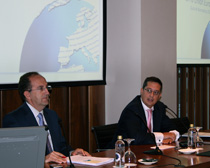The Corporate Reputation Forum and Garrigues Medio Ambiente unveil the 2010 Legislative Guide to Sustainability Reports in the European Union
Over one thousand sustainability reports are published in Europe every year

Non-financial reporting has taken root across Europe, essentially thanks to a voluntary move towards transparency on the part of companies. 2009 saw the publication of more than one thousand annual sustainability and corporate social responsibility (CSR) reports in the European Union. These figures are detailed in the 2010 Legislative Guide to Sustainability Reports in the European Union, prepared by the Corporate Reputation Forum and Garrigues Medio Ambiente, which was launched this morning at the law firm Garrigues’ Madrid head office.
Non-financial reporting has taken root across Europe, essentially thanks to a voluntary move towards transparency on the part of companies. 2009 saw the publication of more than one thousand annual sustainability and corporate social responsibility (CSR) reports in the European Union. These figures are detailed in the 2010 Legislative Guide to Sustainability Reports in the European Union, prepared by the Corporate Reputation Forum and Garrigues Medio Ambiente, which was launched this morning at the law firm Garrigues’ Madrid head office.
The aim of this Guide is to help global businesses meet their non-financial reporting obligations in the countries in which they operate, as well as to establish initiatives of a voluntary nature that may be valued by their stakeholders. The report looks at the EU-15, Norway and the US. For each country, details are given of the sustainability reporting-related legislative requirements, the current state of affairs, corporate trends and initiatives, public policies aimed at promoting CSR and the public entities in charge.
The Guide bears out the fact that transparency of information and periodic reporting are increasingly viewed as factor with a bearing on competitiveness and added value. The publication of sustainability reports is standard even at unlisted companies and has become a widespread good management practice catering to market demand. The study points to the high standards in terms of the quality of information provided by European companies and the increasingly widespread use of international standards such as the GRI (Global Reporting Initiative) or the AA1000 (AccountAbility 1000).
In order to assess the situation in Europe in terms of CSR, the Guide called on the intervention by videoconference of the European Commission Director General of SMEs, Pedro Ortún, who stated that “the Commission's program for the forthcoming year will include a strategic proposal on social responsibility that will bring in new elements such as transparency, the aim of which is clear: to ensure that ever more European companies integrate CSR policies within their business strategy”. Pedro Ortún went on to add that it is essential that the public authorities, private enterprise and civil society in general play a key role in this process.
Piecemeal legislation
The EU framework governing corporate social responsibility is set out in the European Commission communication of July 8, 2002, defining CSR as a voluntary initiative on the part of companies that is intrinsically linked to the concept of sustainable development.
In recent yeas, based on the voluntary framework established by the Modernization Directive (2003), Europe has favored decentralized regulations, giving rise to over 44 legislative reforms to govern, with greater or lesser stringency, non-financial information-related aspects. According to the Guide, four non-financial reporting regulatory models currently exist side by side in Europe, depending on the degree of legislative stringency (from mandatory to voluntary systems). This state of affairs poses a threat to the common goal of having in place homogenous and comparable corporate information for both investors and consumers. Thus, in the words of Alberto Andreu, Director of Corporate Reputation, Identity and the Environment at Telefónica, “embarking on a Europe-wide harmonization process, setting in place standardized rules that prevent the fragmentation of CSR and the loss of a competitive edge, is a top priority”.
The Firm’s Chairman, Antonio Garrigues, brought the presentation of the Guide to a close, noting that while the business community has made significant strides in the area of transparency in recent years, it must continue striving to enhance its corporate reputation
